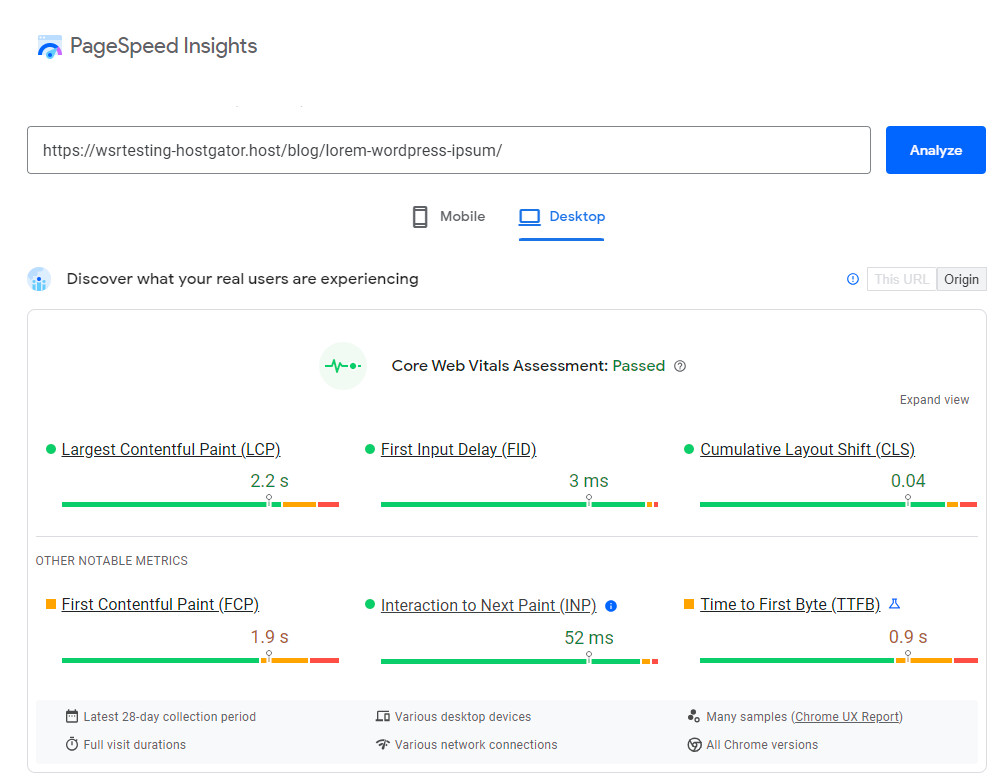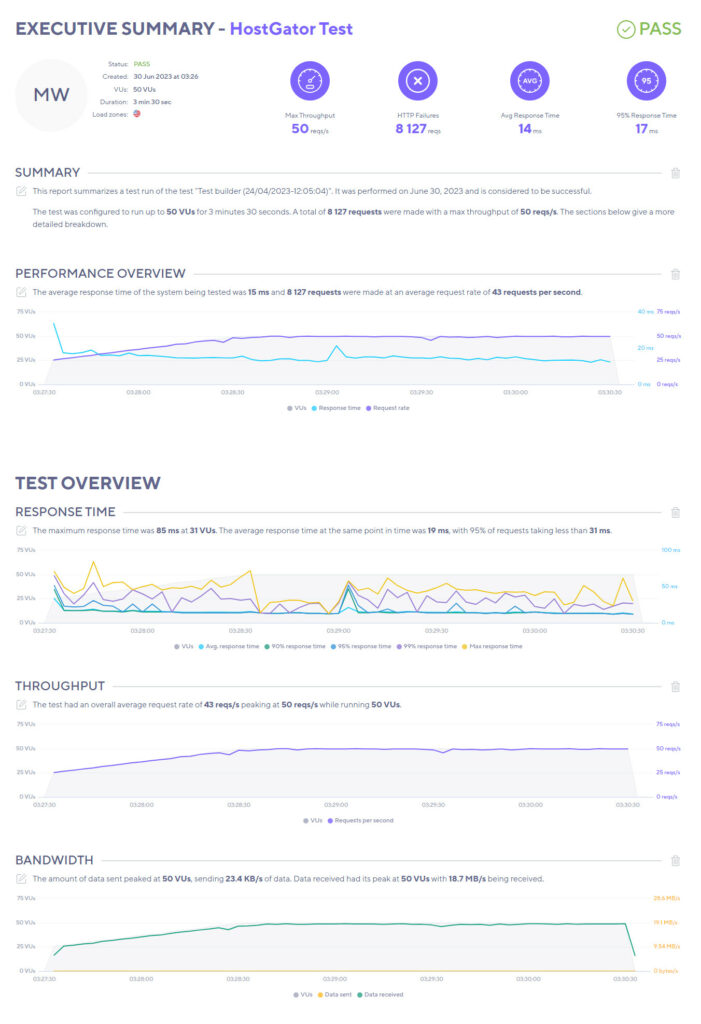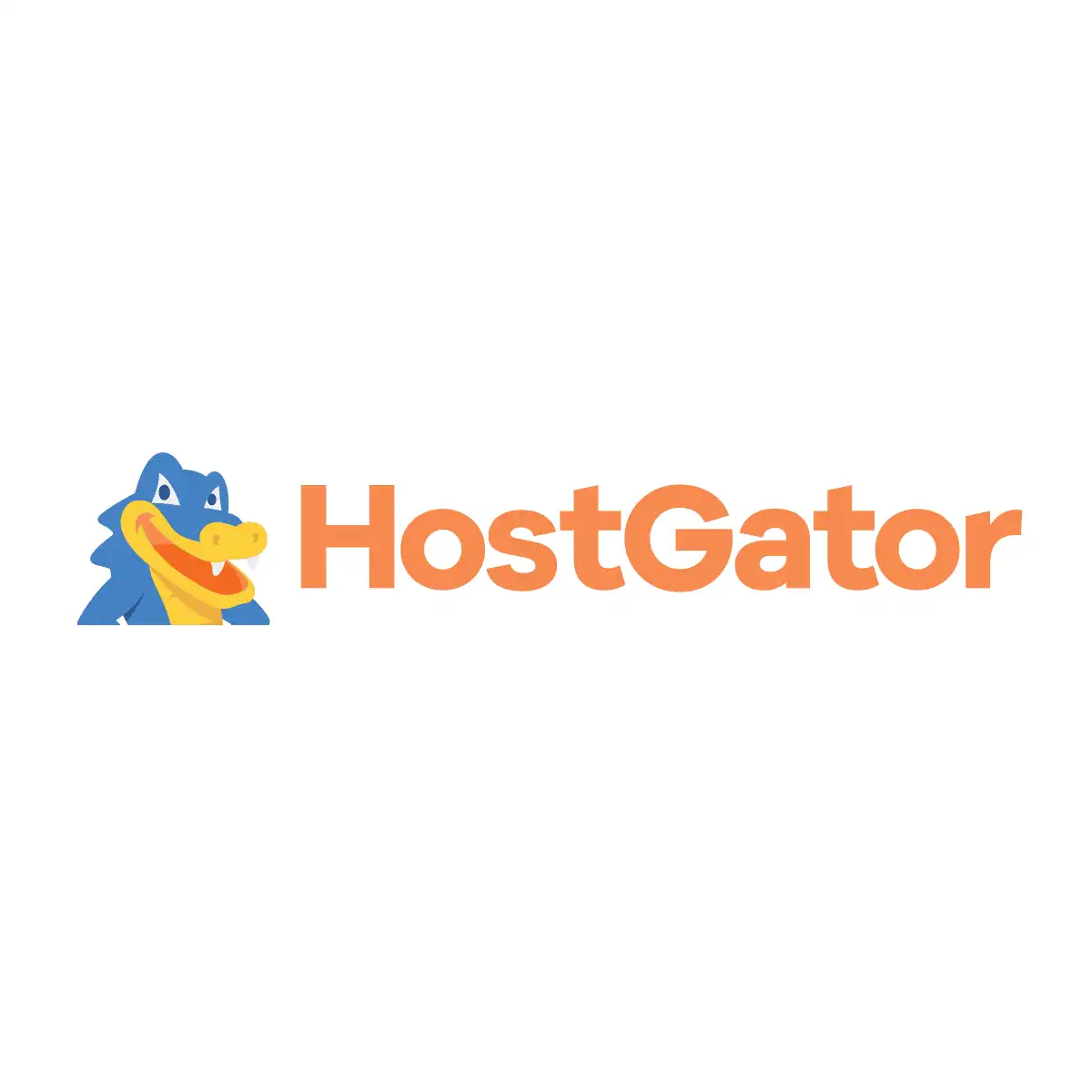HostGator has been a major player in the web hosting industry for over two decades. In this HostGator review, I’ll examine whether their budget-friendly plans and feature set still make them a worthy choice for your website. After thoroughly testing their services, I’ll share my honest assessment to help you decide if this web host is the right fit for your online presence.
HostGator, founded in 2002, has built a reputation for offering affordable hosting solutions. Now part of Newfold Digital, which also owns Bluehost, HostGator continues to be a go-to option for budget-conscious website owners.
With over 2 million websites relying on their services, HostGator’s popularity is undeniable. But does this translate to quality service? Let’s dive into the details to find out if HostGator lives up to its reputation in 2025.
For a quick overview of my findings, check out this video I created summarizing the key points of this review:
To give you a comprehensive understanding of Host Gator’s offerings, let’s break down their strengths and weaknesses:
Pros and Cons
Pros
- Competitive pricing – HostGator’s shared hosting plans are among the most affordable in the industry. Their entry-level plan starts at just $3.75/month with their current 60% discount. Keep in mind that renewal rates will be higher.
- Free domain name – You’ll get a free domain for one year when signing up for annual Shared, WordPress, or Cloud hosting plans.
- Complimentary site migrations – Unlike some competitors who charge for this service, HostGator offers free site transfers. This can save you up to $150 compared to providers like Bluehost.
- WordPress-friendly – HostGator offers seamless WordPress integration. Their dedicated WordPress plans come with the CMS pre-installed, saving you time and effort.
- One-click installations – Easily install popular apps and CMSs with HostGator’s user-friendly dashboard.
- Unmetered resources – HostGator provides unmetered bandwidth and disk space for most plans, giving you flexibility for your website’s growth.
- 99.9% uptime guarantee – This industry-standard uptime promise ensures your site stays accessible to visitors.
- Free SSL certificates – Every hosting package includes a free SSL certificate, enhancing your site’s security and SEO potential.
- Extended money-back guarantee – HostGator offers a generous 45-day refund period, giving you extra time to test their services risk-free.
- Flexible billing options – Choose from 1, 3, 6, 12, 24, or 36-month billing cycles to fit your budget and commitment level.
- Windows hosting available – Unlike many providers, HostGator offers Windows-based hosting for sites requiring specific Windows technologies.
Cons
- Limited free domain eligibility – The free domain offer only applies to Shared, WordPress, and Cloud hosting plans, excluding VPS and Dedicated options.
- Persistent upselling – HostGator, like many EIG-owned companies, engages in aggressive upselling tactics. Be cautious during checkout to avoid unwanted add-ons.
- Basic backup options – While HostGator provides free daily backups, more comprehensive backup solutions require paid add-ons.
- Significant price jumps for short-term plans – Monthly and quarterly billing options come at a premium. For example, the basic shared plan jumps from $2.75/month (36-month term) to $10.95/month for shorter commitments.
- Performance concerns on shared plans – Some users report slower loading times on entry-level shared hosting packages, especially during peak traffic periods.
- Limited advanced features – Power users may find HostGator’s feature set lacking compared to some competitors, particularly in areas like server-level caching and staging environments.
In this review of HostGator, I’ll dive deeper into these pros and cons, sharing my first-hand experiences to help you make an informed decision about whether HostGator is the right choice for your website hosting needs.
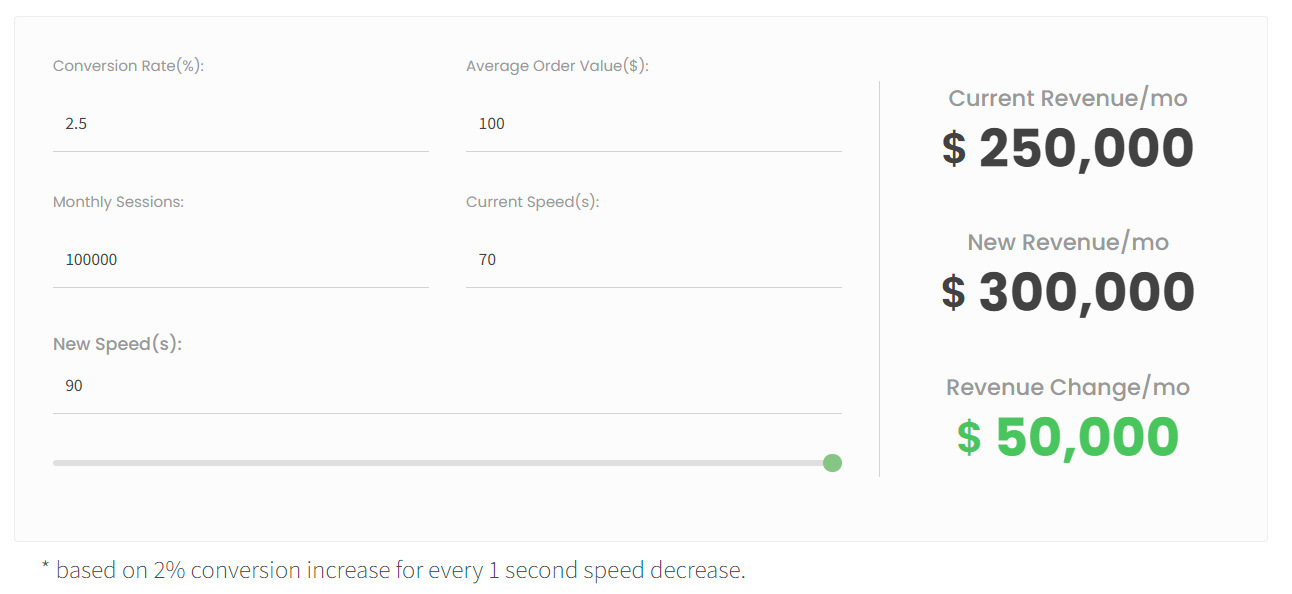
As you can see from these Twitter reviews, real users have varying opinions on HostGator’s services. While some praise their affordability and ease of use, others express frustration with customer support and performance issues. This mixed feedback underscores the importance of thoroughly evaluating your specific needs before committing to any hosting provider.
Standout Features
Solid Speed, Performance & Reliability
In this section, you will find out..
- Why site speed matters… a lot!
- How fast a site hosted on HostGator loads. We will test their speed and server response time against Google’s Core Web Vitals metrics.
- How a site hosted on HostGator performs with traffic spikes. We will test how HostGator performs when faced with increased site traffic.
The most important performance metric that you should look for in a web host is speed. Visitors to your site expect it to load fast instant. Site speed not only affects user experience on your site, but it also affects your SEO, Google rankings, and conversion rates.
But, testing site speed against Google’s Core Web Vitals metrics isn’t enough on its own, as our testing site does not have substantial traffic volume. To evaluate the efficiency (or inefficiency) of the web host’s servers when faced with increased site traffic, we use a testing tool called K6 (formerly called LoadImpact) to send virtual users (VU) to our test site.
Why Site Speed Matters
Did you know that:
- Pages that loaded in 2.4 seconds had a 1.9% conversion rate.
- At 3.3 seconds, the conversion rate was 1.5%.
- At 4.2 seconds, the conversion rate was less than 1%.
- At 5.7+ seconds, the conversion rate was 0.6%.
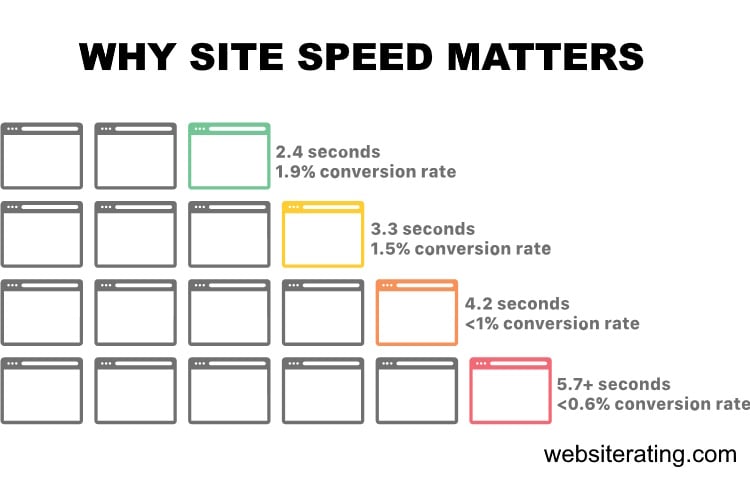
When people leave your website, you lose not only potential revenue but also all the money and time you spent generating traffic to your website.
And if you want to get to the first page of Google and stay there, you need a website that loads up fast.
Google’s algorithms prefer displaying websites that offer a great user experience (and site speed is a huge factor). In Google’s eyes, a website that offers a good user experience generally has a lower bounce rate and loads up fast.
If your website is slow, most visitors will bounce back, resulting in a loss in search engine rankings. Also, your website needs to load up fast if you want to convert more visitors into paying customers.

If you want your website to load up fast and secure the first spot in search engine results, you will need a fast web hosting provider with server infrastructure, CDN and caching technologies that are fully configured and optimized for speed.
The web host you choose to go with will significantly impact how fast your website loads.
How We Perform the Testing
We follow a systematic and identical process for all the web hosts we test.
- Buy hosting: First, we sign up and pay for the web host’s entry-level plan.
- Install WordPress: Then, we set up a new, blank WordPress site using the Astra WordPress theme. This is a lightweight multipurpose theme and serves as a good starting point for the speed test.
- Install plugins: Next, we install the following plugins: Akismet (for spam protection), Jetpack (security and backup plugin), Hello Dolly (for a sample widget), Contact Form 7 (a contact form), Yoast SEO (for SEO), and FakerPress (for generating test content).
- Generate content: Using the FakerPress plugin, we create ten random WordPress posts and ten random pages, each containing 1,000 words of lorem ipsum “dummy” content. This simulates a typical website with various content types.
- Add images: With the FakerPress plugin, we upload one unoptimized image from Pexels, a stock photo website, to each post and page. This helps evaluate the website’s performance with image-heavy content.
- Run the speed test: we run the last published post in Google’s PageSpeed Insights Testing tool.
- Run the load impact test: we run the last published post in K6’s Cloud Testing tool.
How We Measure Speed & Performance
The first four metrics are Google’s Core Web Vitals, and these are a set of web performance signals that are critical to a user’s web experience on both desktop and mobile devices. The last fifth metric is a load impact stress test.
1. Time to First Byte
TTFB measures the time between the request for a resource and when the first byte of a response begins to arrive. It’s a metric for determining the responsiveness of a web server and helps identify when a web server is too slow to respond to requests. Server speed is basically entirely determined by the web hosting service you use. (source: https://web.dev/ttfb/)
2. First Input Delay
FID measures the time from when a user first interacts with your site (when they click a link, tap a button, or use a custom, JavaScript-powered control) to the time when the browser is actually able to respond to that interaction. (source: https://web.dev/fid/)
3. Largest Contentful Paint
LCP measures the time from when the page starts loading to when the largest text block or image element is rendered on the screen. (source: https://web.dev/lcp/)
4. Cumulative Layout Shift
CLS measures unexpected shifts in the display of content in the loading of a web page due to image resizing, ad displays, animation, browser rendering, or other script elements. Shifting layouts lower the quality of the user experience. This can make visitors confused or require them to wait till the webpage loading is completed, which takes more time. (source: https://web.dev/cls/)
5. Load Impact
Load impact stress testing determines how the web host would handle 50 visitors simultaneously visiting the test site. Speed testing alone isn’t enough to test performance, as this test site doesn’t have any traffic to it.
To be able to evaluate the efficiency (or inefficiency) of a web host’s servers when faced with increased site traffic, we used a testing tool called K6 (formerly called LoadImpact) to send virtual users (VU) to our test site and stress test it.
These are the three load impact metrics we measure:
Average response time
This measures the average duration it takes for a server to process and respond to client requests during a specific test or monitoring period.
The average response time is a useful indicator of the overall performance and efficiency of a website. Lower average response times generally indicate better performance and a more positive user experience, as users receive quicker responses to their requests.
Maximum response time
This refers to the longest duration it takes for a server to respond to a client’s request during a specific test or monitoring period.This metric is crucial for evaluating the performance of a website under heavy traffic or usage.
When multiple users access a website simultaneously, the server must handle and process each request. Under high load, the server may become overwhelmed, leading to an increase in response times. The maximum response time represents the worst-case scenario during the test, where the server took the longest time to respond to a request.
Average request rate
This is a performance metric that measures the average number of requests per unit of time (usually per second) that a server processes.
The average request rate provides insights into how well a server can manage incoming requests under various load conditions. A higher average request rate indicates that the server can handle more requests in a given period, which is generally a positive sign of performance and scalability.
⚡HostGator Speed & Performance Test Results
The table below compares web hosting companies’ performance based on four key performance indicators: average Time to First Byte, First Input Delay, Largest Contentful Paint, and Cumulative Layout Shift. Lower values are better.
| Company | TTFB | Avg TTFB | FID | LCP | CLS |
|---|---|---|---|---|---|
| GreenGeeks | Frankfurt 352.9 ms Amsterdam 345.37 ms London 311.27 ms New York 97.33 ms San Francisco 207.06 ms Singapore 750.37 ms Sydney 715.15 ms | 397.05 ms | 3 ms | 2.3 s | 0.43 |
| Bluehost | Frankfurt 59.65 ms Amsterdam 93.09 ms London 64.35 ms New York 32.89 ms San Francisco 39.81 ms Singapore 68.39 ms Sydney 156.1 ms Bangalore 74.24 ms | 73.57 ms | 3 ms | 2.8 s | 0.06 |
| HostGator | Frankfurt 66.9 ms Amsterdam 62.82 ms London 59.84 ms New York 74.84 ms San Francisco 64.91 ms Singapore 61.33 ms Sydney 108.08 ms | 71.24 ms | 3 ms | 2.2 s | 0.04 |
| Hostinger | Frankfurt 467.72 ms Amsterdam 56.32 ms London 59.29 ms New York 75.15 ms San Francisco 104.07 ms Singapore 54.24 ms Sydney 195.05 ms Bangalore 90.59 ms | 137.80 ms | 8 ms | 2.6 s | 0.01 |
HostGator’s TTFB varies significantly depending on the server location, with the best response time in London (59.84 ms) and the worst in Sydney (108.08 ms). The average TTFB is 71.24 ms, indicating a generally good performance across the globe, though there is room for improvement, especially in Sydney.
The FID is 3 ms, which indicates an excellent performance as it is very low. This suggests that users can expect their interactions with the website to be processed quickly.
The LCP is 2.2 seconds, which is acceptable, although striving for a score below 2 seconds would provide an even better user experience. This means it might take a bit longer for users to see the largest content on the webpage.
The CLS is 0.04, which is a strong score, indicating minimal layout shift and providing a stable experience for users. Google recommends a CLS score of less than 0.1, so HostGator is well within this range.
HostGator has solid performance metrics. There are some differences in TTFB based on server location, and there could be improvements to the LCP. However, the FID and CLS scores indicate a good user experience overall.
⚡HostGator Load Impact Test Results
The table below compares web hosting companies’ performance based on three key performance indicators: Average Response Time, Highest Load Time, and Average Request Time. Lower values are better for Average Response Time and Highest Load Time, while higher values are better for Average Request Time.
| Company | Avg Response Time | Highest Load Time | Avg Request Time |
|---|---|---|---|
| GreenGeeks | 58 ms | 258 ms | 41 req/s |
| Bluehost | 17 ms | 133 ms | 43 req/s |
| HostGator | 14 ms | 85 ms | 43 req/s |
| Hostinger | 22 ms | 357 ms | 42 req/s |
HostGator’s Average Response Time is 14 ms, which is excellent, indicating that the server generally responds to requests very quickly.
The Highest Load Time is 85 ms, also an impressive figure. This suggests that even under high traffic load, HostGator servers can respond to requests in less than a tenth of a second.
The Average Request Time is 43 requests per second, which is a measure of throughput rather than speed. This indicates that HostGator’s servers can handle a high number of simultaneous requests, making it suitable for websites that expect to experience periods of high traffic.
HostGator demonstrates strong performance in both response times and handling high traffic loads. This suggests that it’s well-suited for hosting websites with variable or high traffic levels, as it can quickly respond to requests and manage a large number of requests simultaneously.
Solid Uptime
They promise a 99.9% uptime guarantee, which is great news for any website owner. However, it’s important to keep in mind that this is the standard, and anything less is not generally tolerated.
Page speed is important, but it’s also important that your website is “up” and available to your visitors. I monitor uptime for a test WordPress site hosted on HostGator to see how often they experience outages.
Sites that load slowly aren’t likely to rise to the top in any niche. A study from Google found that a one-second delay in mobile page load times can impact conversion rates by up to 20%.
The above screenshot only shows the past 30 days, you can view historical uptime data and server response time at this uptime monitor page.
Adding to that, HostGator is prepared to compensate its customers with a one-month credit if at any time the server falls short of the 99.9% uptime guarantee.
Security and Backup
HostGator is equipped with a custom firewall that is aimed at protecting its customers’ websites against DDoS attacks. HostGator also offers an SSL on all Hostgator plans and they also have free SSH access (but needs to be enabled in the dashboard).
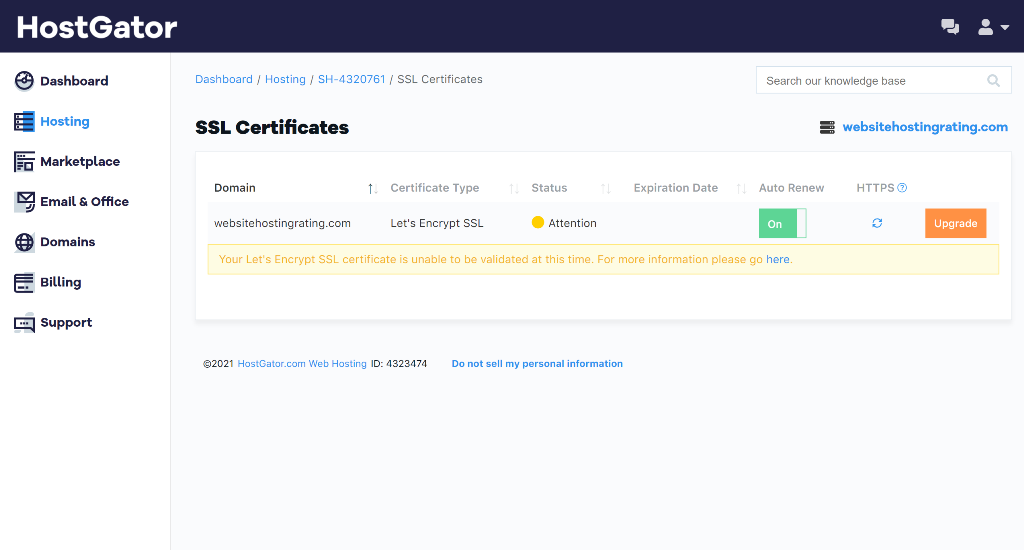
You can easily get additional security through the SiteLock app which includes automatic daily and continuous malware scans and malware removal, basic CDN, database scanning, blocking of automated bot attacks, and a lot more stuff, depending on which plan you choose (they start at $5.99 per month).
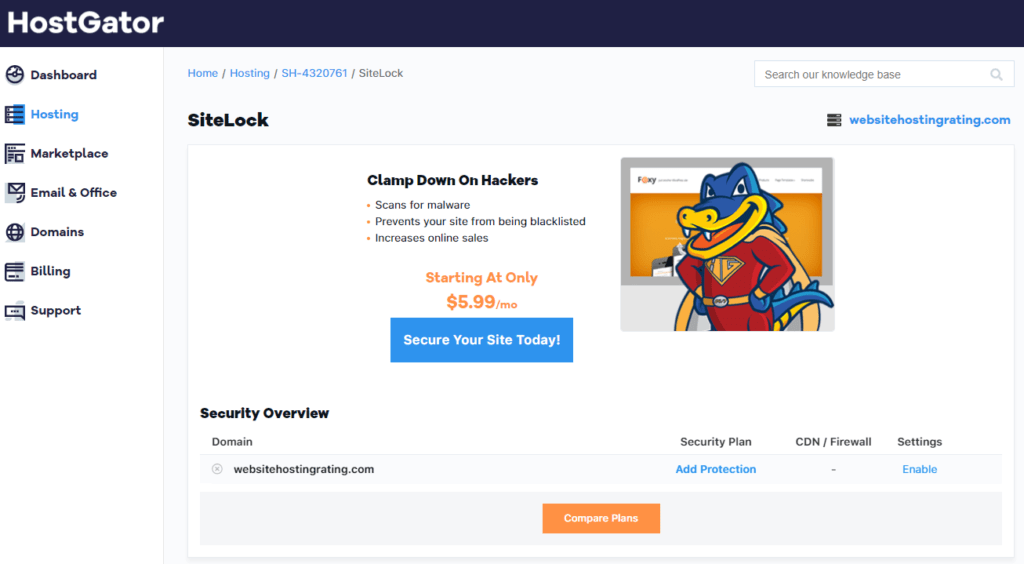
SiteLock is a paid addon that scans for malware and prevents your site from being blacklisted. HostGator’s SiteLock starts from $5.99 per month.
Currently, Cloudflare’s CDN is free of charge only on the shared hosting Business plan that HostGator provides. Cloudflare CDN is a good idea to have because it not only provides extra protection for your site from various hacker attacks and malware but also gives your site a serious performance boost.
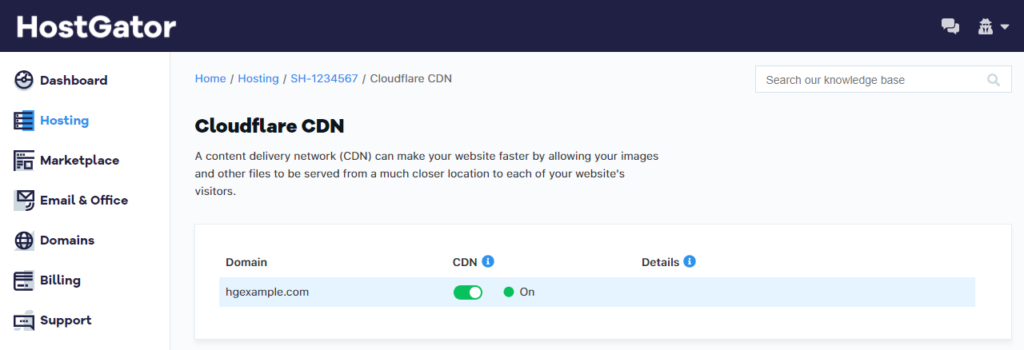
If you purchased and registered your domain with HostGator, you can automatically enable Cloudflare. If you purchased a domain with another provider, you will need to make sure that the domain is using HostGator name servers.
What about backups?
HostGator does offer a complimentary backup service on all their plans that runs once a week, and the day is chosen at random. Each subsequent backup erases the previous one, which means you won’t have any previous backup versions of your site. According to HostGator, the terms of their backup policies depend on what kind of hosting plan you’re currently using.
However, you should have in mind that these free backups are considered a kind of courtesy and they shouldn’t serve as the only guarantee for your site’s backup system. HostGator is clear that the customer is responsible for their website content and their backups and that they should make additional backups if they want extra protection for their site.
HostGator CodeGuard
This means that if you run a more serious and complex site, with lots of data and especially business information, you should definitely seriously consider a third-party app for backup, such as CodeGuard, which HostGator officially recommends.
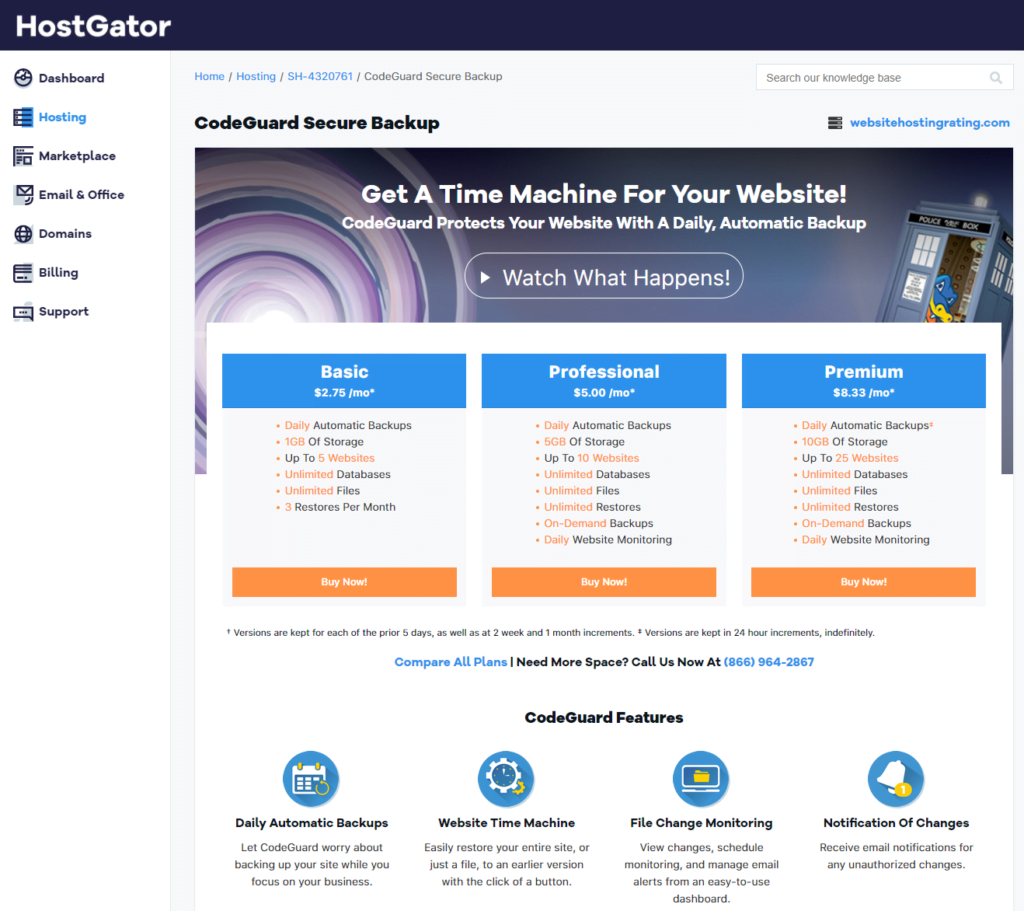
CodeGuard offers daily automated backups, unlimited databases and files, on-demand backups, and daily website monitoring, as well as 1-10 GB of storage, depending on which of the three plans you choose. The most basic one starts at $3.75/month.
What all of this means is that if you opt to use the free security features that HostGator provides, you’ll be left with a very basic array of options. The same goes for backup features. If you’re just starting out with your site and you intend to keep it pretty light and low-key in the beginning, then you don’t need all of these add-ons.
But if you want to start an online business and your site becomes loaded with data and customer info, then I would definitely recommend getting third-party help for extra protection.
HostGator Website Builder
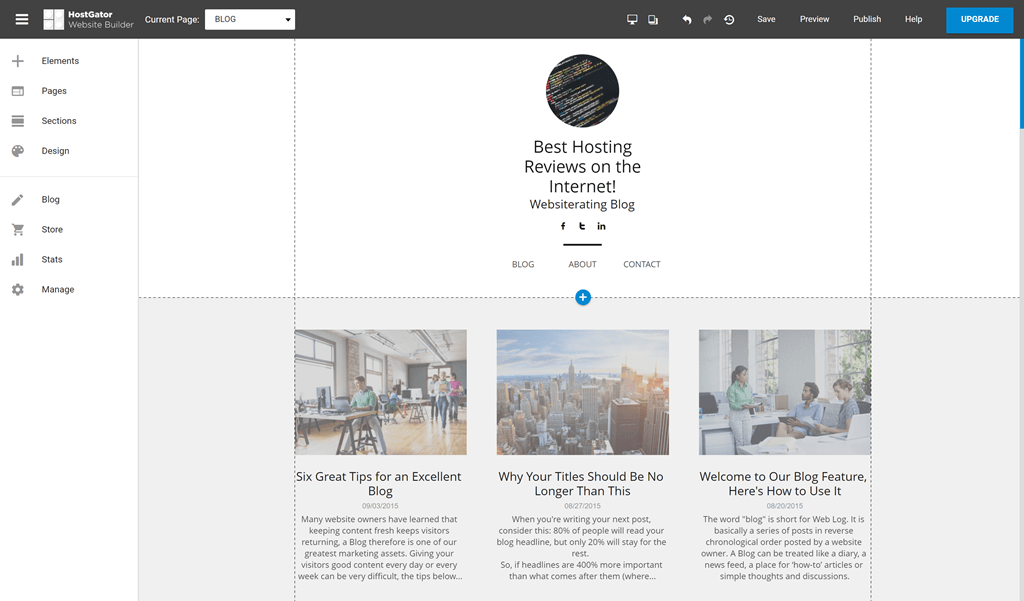
HostGator includes their own website builder for free in all plans. HostGator’s builder is a very handy tool to have, especially if you’re new to creating and running a website.
It’s a builder that makes the website creation experience extremely easy through its intuitive setup, drag-and-drop interface, hundreds of pre-built templates, and whole pages, as well as it’s simple, but also varied options for customization.
The image above is a screenshot from a test page that we created to see just what this built-in builder can do.
Some additional features that you can find in HostGator site builder are HD video embedding, branding removal, easy social media integration, Google Analytics, PayPal payment gateway, coupon codes, SEO tools for better search engine results, as well as inventory management, and an eCommerce shopping cart.
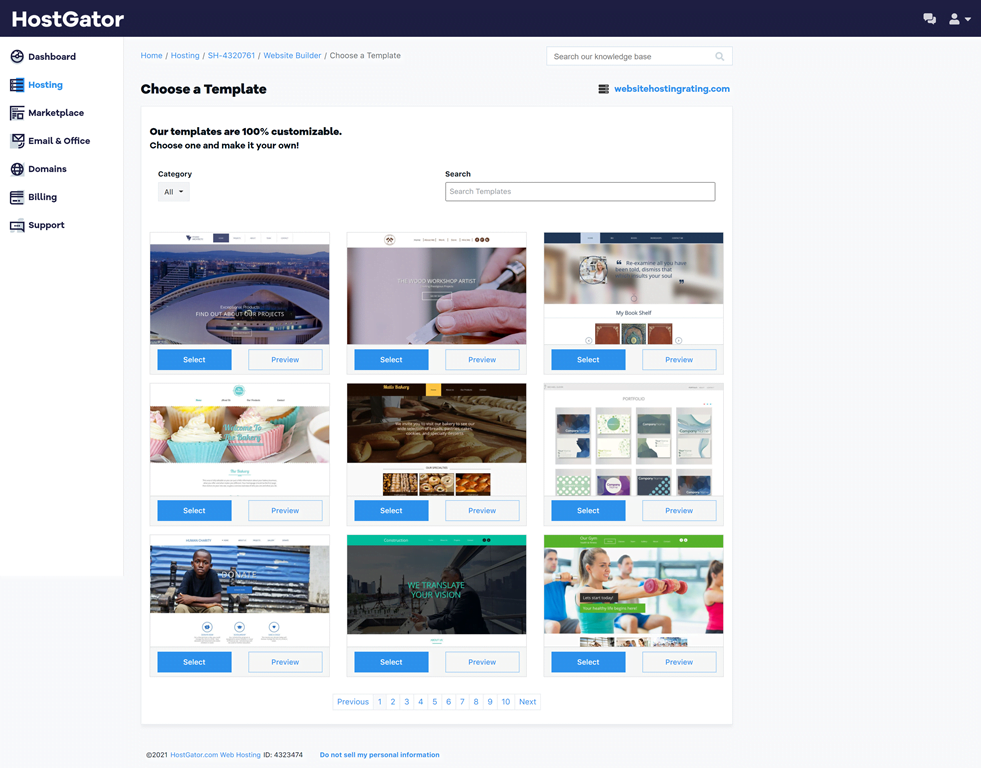
You can also purchase HostGator’s website builder individually, and with that, also get HostGator’s web hosting services (whichever works for you best). Otherwise, as I said earlier, the website builder comes for free with all of HostGator’s hosting plans.
Save for the most basic shared hosting package, which limits the domains to 1, HostGator offers unlimited everything (well sort of – see below) else which is a great deal since their plans are so cheap, to begin with.
(Almost) Unlimited Bandwidth & Unlimited Disk Space
Unlimited bandwidth and unlimited disk space mean you can transfer and store as much data as you need. “Unmetered” allows for the seemingly limitless growth of your website while using an affordable shared hosting plan.
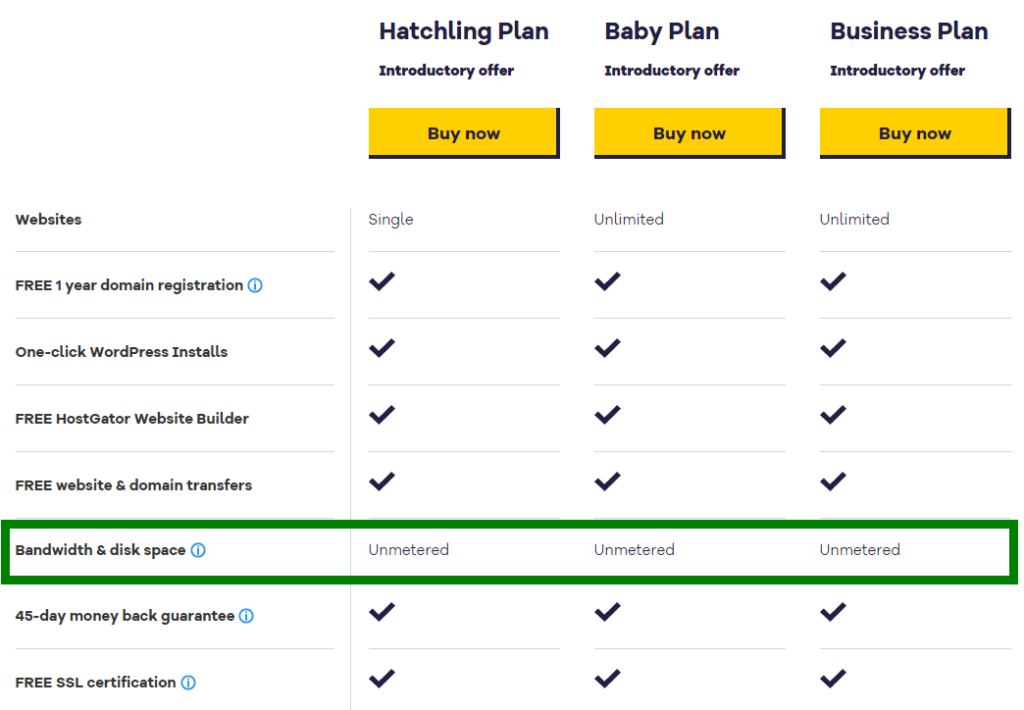
Having unmetered bandwidth means you can move an unlimited amount of data between your host server, your site visitors, and the internet. This is great for ensuring the speed and performance of your website, especially on a shared plan.
You also receive unlimited databases, which means you can have as many WordPress installations as you want. This is good for those who have many clients and want to test website changes before pushing them live.
However, you should know that “Unlimited” hosting is a myth and at least HostGator is transparent about their resource usage limitation. They offer “unlimited everything”, as long as you:
- Don’t use more than 25% of the server’s central processing unit (CPU)
- Don’t run more than 25 simultaneous processes in cPanel
- Don’t have more than 25 simultaneous MySQL connections
- Don’t create more than 100.000 files in cPanel
- Don’t check more than 30 emails per hour
- Don’t send more than 500 emails per hour
However, there is no limitation on:
- Bandwidth you use
- Email accounts you create
At least HostGator is open and transparent about it (most other cheap web hosting companies aren’t!).
Free Site Transfer & One-Click Install WordPress
Migrating websites from one host to another is typically the norm for most web hosting companies, however, most companies only provide free website transfers for WordPress sites.
Not HostGator. They make transferring any type of site from another host to them simple, and free. Simply sign up for the plan you wish to use, and let HostGator do the rest.
Depending on which type of hosting account you sign up for, the number of free migrations they offer varies:
| Hosting Type | Free Site Migration | Free cPanel Migration | Free Manual Migration |
|---|---|---|---|
| Shared / Cloud Hosting | 1 site | 1 site | 1 site |
| Optimized WP Hosting (Starter) | 1 blog | Not Available | Not Available |
| Optimized WP Hosting (Standard) | 2 blogs | Not Available | Not Available |
| Optimized WP Hosting (Business) | 3 blogs | Not available | Not Available |
| Reseller Hosting | 30 sites | 30 sites | 30 sites |
| VPS Hosting | Unlimited sites | Unlimited sites | 0 – 90 sites |
| Dedicated Hosting (Value, Power, and Enterprise) | Unlimited sites | Unlimited sites | 100 sites |
Adding to that, if you are new to owning a website, and HostGator is the first hosting solution you have ever used, rest assured that installing your preferred CMS(Content Management System) like WordPress is as easy as clicking a few buttons during sign-up.
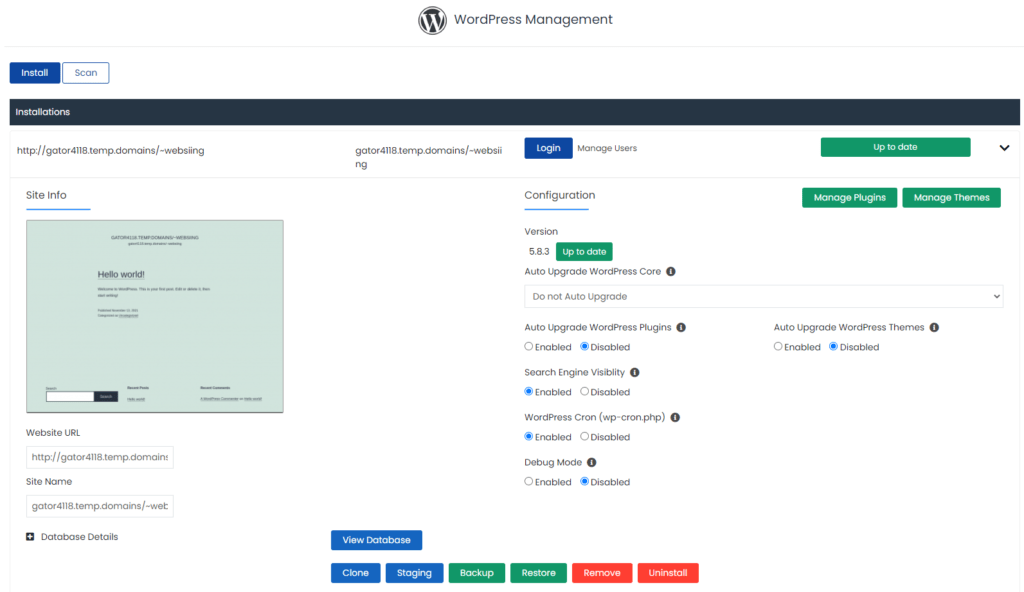
Using their 1-click-install tool, you can easily set up your website without worrying about having technical knowledge.
Your installed WordPress site comes with pre-installed plugins like Jetpack, OptinMonster, and WPForms – as well as HostGator performance tools like built-in caching.
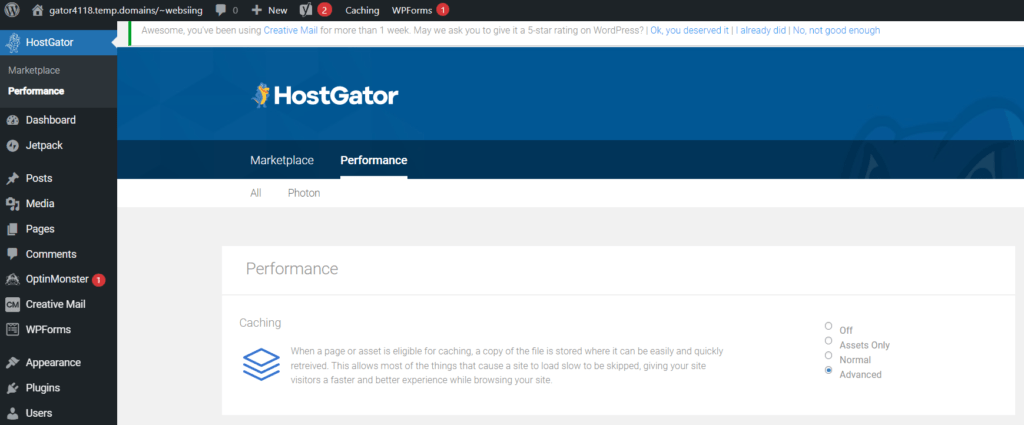
Customer Hostgator Support
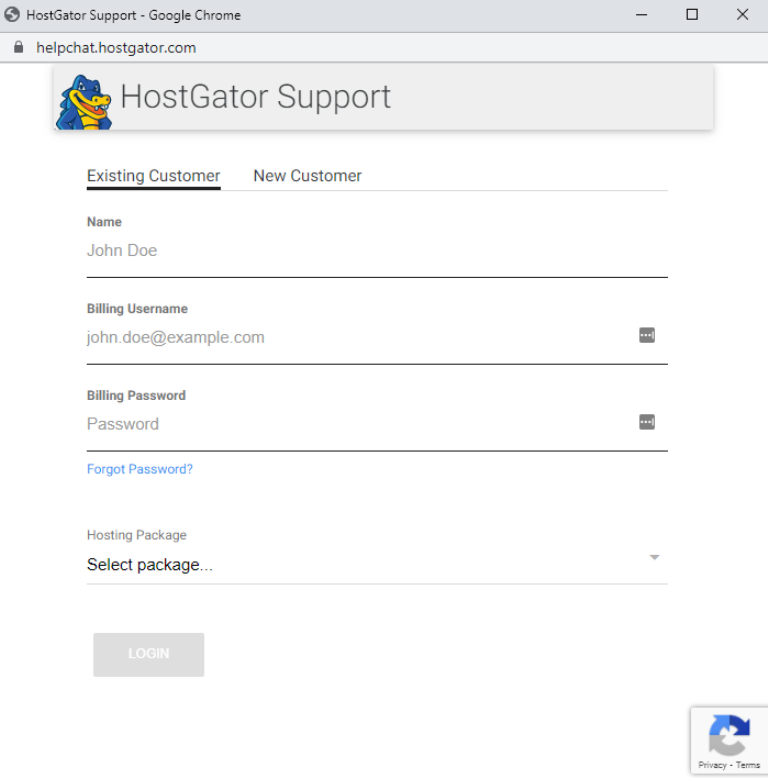
There are two main ways you can reach HostGator’s customer service. One is through the live chat option in which you can introduce yourself as a new customer or an existing customer and explain your problem in more detail by selecting a topic, a set of offered descriptions for the problem, and then filling out a small field with the specific details of your question or problem.
The other main Hostgator customer service option is by calling the support team directly at the number (866) 96-GATOR. Both of these options can be reached 24/7, 365 days a year.
You will also be able to find additional info and answers to various questions about HostGator’s services through their vast knowledge base. HostGator’s knowledge base contains 19 categories (with their own subcategories) that include hosting services, policies, the website builder, cPanel, files, design tools, optimization, partnership programs, and more.
If you have any questions, you can write them down in the search window at the top of the knowledge base page. We wrote “how to enable SSL certificate” and this is what came out:
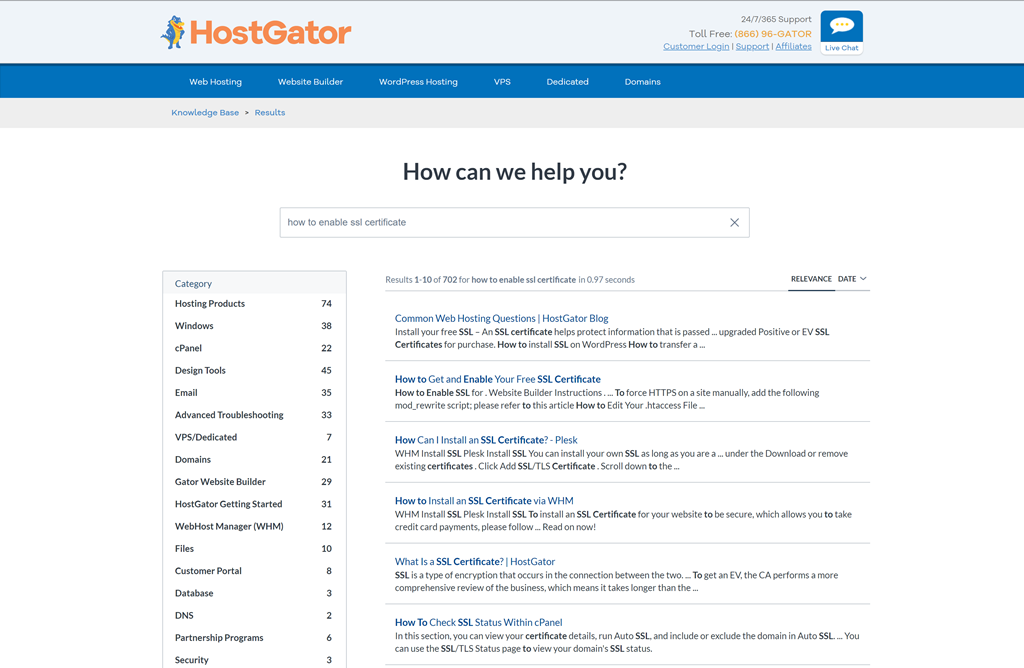
As you can see, there are a number of answers to this question that the base holds in its archive. Some of the answers provided are more specific, and some less, but they are all somehow related to the target word in the question related to “SSL certificate.” This basically works as a FAQ section.
There is another type of knowledge base that HostGator has compiled, and that is the HostGator blog. It has five categories:
- HostGator Happenings
- Marketing Tips and Tricks
- Startup & Small Business
- Infographics
- Web Hosting Tips
This blog works as a vast network of how-to resources, in-depth articles, and various tips on how to manage and expand your site and how optimize your hosting experience.
HostGator Cons
As with every web hosting service out there, there are going to be some disadvantages to using such a cheap, web hosting solution. Here are the biggest negatives.
Limited Features
While the overall features provided are pretty standard, and a free domain, free website transfer, and unlimited everything are nice, the truth is, HostGator doesn’t offer shared hosting users a whole lot of standard features.
Features that should be standard, and that most other web hosts include in their packages for free, aren’t with HostGator:
- Automated website backups is a paid addon (CodeGuard)
- Website security such as malware protection is a paid addon (SiteLock)
While the overall features provided are pretty standard, and a free domain, free website transfer, and unlimited everything are nice, the truth is, HostGator doesn’t offer shared hosting users a whole lot of standard features.
Features that should be standard, and that most other web hosts include in their packages for free, aren’t with HostGator:
- Automated website backups is a paid addon (CodeGuard)
- Website security such as malware protection is a paid addon (SiteLock)
Is Part of Newfold Digital (formerly EIG)
Again, I am not going to attempt to sway you either way when it comes to the reputation of Newfold Digital. However, most people who review hosting companies will say that a hosting company that is part of thisruns the risk of harboring a bad reputation.
That’s because if you were to go with hosting company A (that is part of Newfold Digital and you didn’t know it) and have a bad experience, and move to host company B (also part of Newfold Digital and you didn’t know it), who is to say your experience is going to get any better?
Just be aware that HostGator is a part of this group of companies and that the way it runs things is probably going to trickle down into how HostGator handles things.
Compare HostGator Competitors
When choosing a web hosting service, comparing the available options is important. Here’s a look at how HostGator stacks up against its competitors: SiteGround, Hostinger, Bluehost, BigScoots, and HostArmada.
| Feature | HostGator | SiteGround | Hostinger | Bluehost | BigScoots | HostArmada |
|---|---|---|---|---|---|---|
| User-Friendliness | Good for beginners | Good for beginners and tech-savvy | Extremely user-friendly | Good for beginners | Professional, business-focused | Innovative, user-friendly |
| Pricing | Affordable | Mid-range | Very affordable | Affordable | Premium | Affordable |
| Performance | Reliable with Cloudflare CDN | Custom CDN, advanced features | Good performance | Advanced PHP support | High performance, managed | Innovative tech, reliable |
| Support | Good customer support | Excellent support | Strong support | Strong support | Personalized premium support | Good support |
| Special Features | Gator Website Builder | AI Email Writer, custom CDN | Budget-friendly plans | E-commerce enhancements | Managed hosting services | Cutting-edge hosting solutions |
SiteGround
- Similarities: Reliable hosting with strong customer support.
- Differences: SiteGround offers advanced features like AI Email Writer and a custom CDN, catering more to e-commerce and tech-savvy users.
- Learn more in our SiteGround review here.
Hostinger
- Similarities: Both are budget-friendly and user-friendly, ideal for beginners.
- Differences: Hostinger is known for extremely affordable plans, making it more suitable for users with tight budgets.
- Learn more in our Hostinger review here.
Bluehost
- Similarities: Both offer easy WordPress integration and are beginner-friendly.
- Differences: Bluehost focuses on e-commerce enhancements and advanced performance features like PHP 8.2 support.
- Learn more in our Bluehost review here.
BigScoots
- Similarities: Both provide reliable hosting services with strong uptime records.
- Differences: BigScoots is known for its personalized support and premium managed hosting services, targeting more professional and business users.
- Learn more in our BigScoots review here.
HostArmada
- Similarities: Affordable and reliable hosting solutions with good customer support.
- Differences: HostArmada is relatively new with a focus on innovative technologies and services, appealing to users looking for cutting-edge hosting solutions.
- Learn more in our HostArmada review here.
HostGator Hosting Plans
HostGator offers a variety of hosting plans. All in all, you can find eight hosting options with different fee schedules:
- Shared hosting – this is HostGator’s cheapest hosting plan, starting at just $3.75/month, with the current discount, paid on a 36-month basis. This type of hosting is just what the name suggests – your website shares a server and the resources necessary for its operations with other similarly small websites from different site owners. It is not bad when you’re just starting out, if your site doesn’t require too much power, and if you aren’t expecting too big of a traffic surge.
Prices from just $3.75/month make HostGator one of the cheapest web hosts in the industry.
- Cloud hosting – as the name suggests, cloud hosting uses the resources of cloud technology. This means that, unlike other types of hosting, which use a single server, cloud hosting uses a network of connected virtual cloud servers that host the website or application in question. This means that your site will be able to use the resources of multiple Hostgator servers. Cloud hosting is recommended for websites and online businesses that need fast loading times, at all times, even if they experience frequent traffic surges, like the ones coming from promotions, current offers, or sales. In short, cloud hosting provides more scalability, flexibility, and reliability. With the current discount, HostGator provides the cheapest cloud hosting plan costs $4.95 per month, paid on a 36-month basis.
- VPS hosting – VPS stands for a virtual private server, which basically describes dedicated resources that are only for your site on a particular server. What this means is that physically speaking, your site is still on a shared server (a.k.a. the server’s hardware), but the resources that your site needs are yours and yours only (such as CPU power or RAM memory, for example). VPS is the best option for website owners who want more control over their hosting resources and hosting environment. Also, if you experience a growth in traffic or need to manage multiple websites and require the necessary resources to manage them in an effective way, while also not wanting to pay the extra money, then you should consider signing up for a VPS plan. VPS hosting plans start at $19.95 per month, paid every 36 months.
- Dedicated hosting – dedicated hosting goes a level beyond VPS hosting. With this hosting plan, you get a server just for you. You’ll be able to use all its resources and power multiple websites, without having to share space and resources with other users. Dedicated hosting is a good idea when you notice that you’re running out of space, or you notice that your site has been loading slower than usual. If your audience has grown over time, and you have more traffic, more site demands, and you generally need more space and want a faster website, as well as full control of your server, you might want to think about getting a dedicated server hosting plan. With the current discount, dedicated plans start at $89.98 per month, paid every 36 months.
- WordPress hosting – as the name suggests, this hosting plan is specifically aimed at powering WordPress sites. It means that it has more features that are related to WP and it makes setting up a WP page easier and more efficient, compared to other hosting plans. It’s recommended for people who specifically want to create and run a WordPress website. This hosting plan starts out at $5.95 per month (paid on a 36-month subscription), with the current discount.
- Reseller hosting – also called “white label hosting”, enables you to offer hosting services as if you yourself were a real hosting company. You can offer your services to clients without the hassle of actually creating a hosting company from scratch. It means you don’t need to deal with server and software maintenance or handle any uptime troubles. This type of hosting allows you to make money from providing hosting services to others, though they’re actually facilitated by HostGator. It’s best for agencies or freelancers who offer their clients services related to web design and web development, as well as other business-related services. It allows them to promote their brand and receive income from their customers, as well as combine hosting options with other services they might offer. HostGator ensures a client management and billing software called WHMCS which is included, for free, in all of their reseller plans. The plans start at $19.95 per month, for 36 months, with the current discount.
- Windows hosting – a large portion of hosting hostgator servers out there run on the Linux operating system, which is the most popular one by far, but some also run on Windows. This is because there are certain applications that can only run on Windows servers, as well as specific Windows-related technologies that are only possible with this kind of hosting. For example, ASP.NET developers cannot work on any other type of hosting software. Windows hosting plans start at $4.76 per month, with the current discount, paid on a 36-month basis.
- Web application hosting – Application hosting allows you to host and run your applications on a cloud or regular server that HostGator offers. This means that your application can be accessed from the internet, so it doesn’t need to be downloaded, and your clients and users can interact with a web-based user interface. HostGator’s hosting services run on multiple operating and data management systems such as Linux, MySQL, Apache, and PHP, making them compatible with lots of other software and existing applications. With the current discount, the starter plan for the Web application hosting plan is pretty cheap, coming at only $2.75/month, paid every 36 months.
I will go into more detail about the key features of each of these plans in the Pricing Plans section in the next section of this article.
Plans & Pricing
As I mentioned earlier, HostGator offers eight types of hosting services. First, I’d like to give you an overview of all of their hosting plans, and then, I’ll also get into more details about each of the key features of the types of hosting services they offer.
| Plan | Pricing |
|---|---|
| Free plan | No |
| Shared hosting plans | |
| Hatchling plan | $3.75/month* (with the current 60% discount) |
| Baby plan | $4.50/month* (with the current 65% discount) |
| Business plan | $6.25/month* (with the current 65% discount) |
| Cloud hosting plans | |
| Hatchling cloud | $4.95 per month* (with the current 45% discount) |
| Baby cloud | $6.57 per month* (with the current 45% discount) |
| Business cloud | $9.95 per month* (with the current 45% discount) |
| VPS hosting plans | |
| Snappy 2000 | $19.95 per month* (with the current 75% discount) |
| Snappy 4000 | $29.95 per month* (with the current 75% discount) |
| Snappy 8000 | $39.95 per month* (with the current 75% discount) |
| Dedicated hosting plans | |
| Value Server | $89.98 per month* (with the current 52% discount) |
| Power Server | $119.89 per month* (with the current 52% discount) |
| Enterprise Server | $139.99 per month* (with the current 52% discount) |
| WordPress hosting plans | |
| Starter Plan | $5.95 per month* (with the current 40% discount) |
| Standard Plan | $7.95 per month* (with the current 50% discount) |
| Business Plan | $9.95 per month* (with the current 57% discount) |
| Reseller hosting plans | |
| Aluminum Plan | $19.95 per month* (with the current 43% discount) |
| Copper Plan | $24.95 per month* (with the current 49% discount) |
| Silver Plan | $24.95 per month* (with the current 64% discount) |
| Windows hosting plans | |
| Personal Plan | $4.76 per month* (with the current 20% discount) |
| Enterprise Plan | $14.36 per month* (with the current 20% discount) |
| Web application hosting plans | |
| Hatchling Plan | $2.75/month* (with the current 60% discount) |
| Baby Plan | $3.50 per month* (with the current 65% discount) |
| Business Plan | $5.25 per month* (with the current 65% discount) |
* These prices refer to the 36-month plan. The plans renew according to their regular rates.
45-Day Money-Back Guarantee
When it comes to money-back guarantees, HostGator is more generous than a lot of other hosting providers out there.
If you sign up for one of HostGator’s hosting plans, you’ll be able to get a full refund of your money within the first 45 days if you’re not satisfied with the plan you’ve chosen and paid for.
You should keep in mind that this money-back guarantee refers to the basic hosting services HostGator offers. It doesn’t refer to any setup fees or domain registration fees, or to any other fees that apply to additional services you might’ve purchased or used from HostGator.
After the 45-day window passes, you won’t be able to get a refund of your money anymore.
Shared Hosting Plans
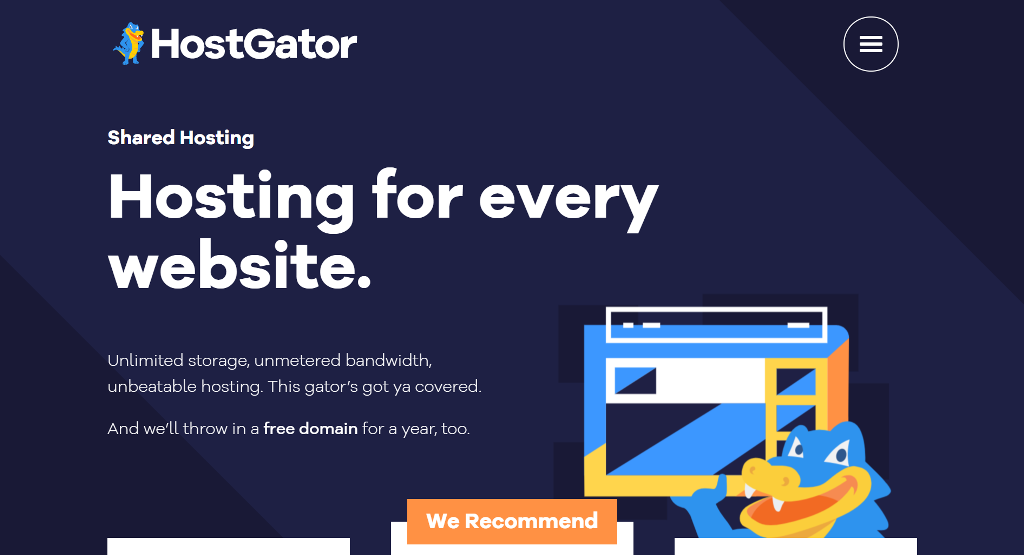
As you are able to see, HostGator’s shared hosting plans are definitely among the cheapest shared plans you can find.
Starting at just $3.75/month with the current 60% discount, the basic Hostgator’s shared hosting plan (called the Hatchling plan) offers unlimited storage, unmetered bandwidth, and:
- A single website
- Free SSL certificate
- Free Domain
- One-click WordPress installation
- Free WordPress/cPanel website transfer
The Baby plan, which is slightly more expensive, comes at $4.50/month, and it is pretty similar to the Hatchling plan. The main difference is that instead of a single website, this plan allows you to host an unlimited number of websites.
The Business shared plan offers additional benefits, such as:
- Free SEO tools
- Free dedicated IP
- Free upgrade to Positive SSL
All of the plans within the Shared hosting plan offer unmetered bandwidth, which means you shouldn’t worry about any occasional traffic spikes (although if they keep happening too often, HostGator is probably going to contact you and ask you to get a bigger plan).
You’ll also be able to get a domain and register it for free. The SSL certificate also comes with all plans, making your site secure and trustworthy. And last but not least are the one-click WordPress installation, which makes WP integration all the easier.
HostGator includes free email accounts with the POP3 and SMTP protocols. It also offers 25 mailing lists for all plans, webmail access, and spam protection with the help of SpamAssassin.
Cloud Hosting Plans
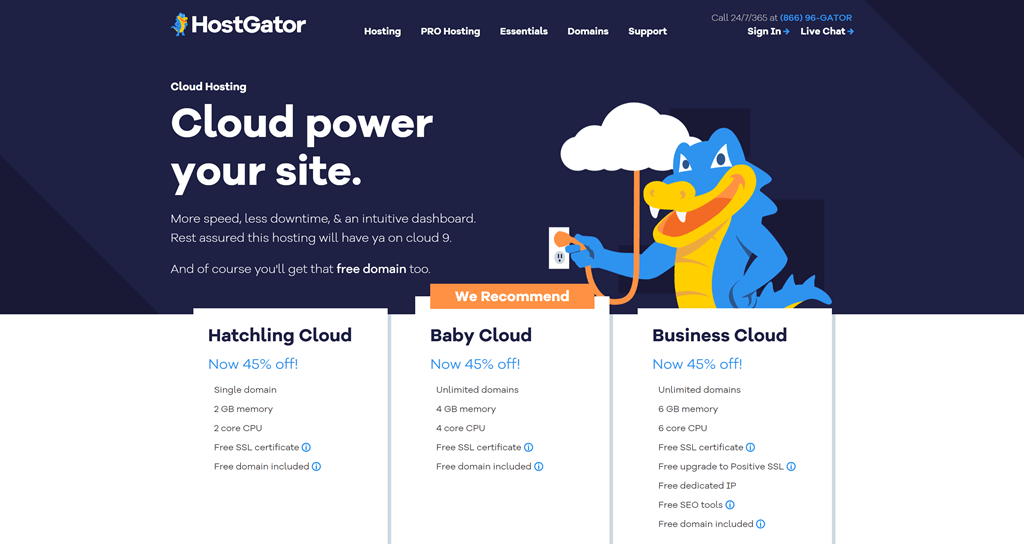
Should you want to use the resources of several cloud servers, you should opt for HostGator’s cloud hosting plans.
They’re also pretty cheap and start at $4.95 per month (paid every 36 months), with the current 45% discount.
The basic, Hatchling cloud hosting plan offers:
- Single domain
- Free SSL certificate
- Free Domain
- 2 GB memory
- 2 core CPU
The Baby cloud plan is similar to the Hatchling plan but upgraded. It offers the basics such as an SSL and domain, but it also offers hosting for an unlimited number of domains, as well as 4 GB memory and 4 core CPU power.
The premium plan in HostGator’s cloud hosting offers, a.k.a. the Business cloud plan also offers an unlimited number of domains, a free domain, and SSL, but it additionally offers a free upgrade to Positive SSL, a free dedicated IP, and free SEO tools. Its cloud servers are able to provide 6 GB memory and 6 core CPU power resources for your site.
The cloud server plans have an integrated caching option, which means your site will always have an optimal caching configuration that makes it load pretty fast. You’ll be able to control the performance of your site and have a clear overview of all the metrics you need for your site’s success through their intuitive dashboard.
Easy resource management and total control over resources allow you to increase and improve the resources your site needs to operate seamlessly, so you needn’t worry should you get a traffic spike, for example. Also, if another unexpected issue arises, you’ll be able to tackle it in real time.
The cloud hosting plan also includes an automated failover. This means that if one of the servers your site is being hosted on through the cloud network experiences a hardware issue, your site’s performance and availability won’t suffer: the automated failover allows for an automatic transfer to another fully functional server.
The cloud hosting plans offer unlimited email accounts with SMTP and POP3 protocols, a standard of 25 mailing lists, spam prevention with SpamAssassin, access to email via phone through IMAP, as well as unlimited email aliases, unlimited mail forwards, and unlimited autoresponders. This is a great Hostgator email hosting you can consider for your business.
VPS Hosting Plans
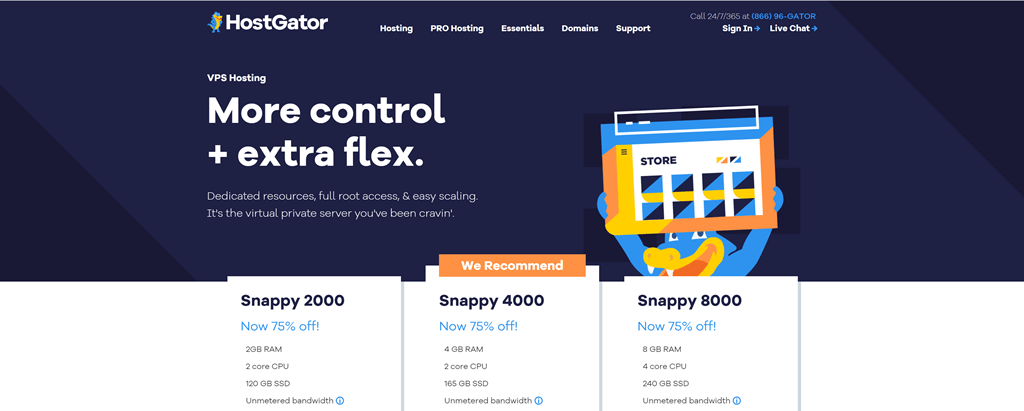
HostGator’s VPS hosting plans give you full root access to the server’s resources, and plenty of dedicated resources.
The basic plan, called Snappy 2000, starts at $19.95 per month paid every 36 months with the current whopping 75% discount, and includes:
- 2GB RAM
- 2 core CPU
- 120 GB SSD
All plans include unmetered bandwidth and 2 dedicated IPs.
The second, Snappy 4000 plan has the same 2-core CPU power, but it offers 4 GB RAM memory and 120 GB SSD memory.
The most premium plan from this group, the Snappy 8000 includes an upgrade of the CPU power with a 4-core CPU, as well as 8 GB RAM memory and 240 GB SSD memory.
These plans offer full root access to the virtual private server’s resources, so you can manage the CMS(Content Management Systems) on your own should you want to, as well as insert custom code.
This hosting also includes advanced functionality meaning you get to create an unlimited number of email addresses, as well as unlimited domains, FTP accounts, databases, and much more.
HostGator’s VPS hosting uses hardware from proven industry leaders such as AMD and Intel, which means your site is going to use only the best and the fastest.
You’ll also be able to use a full suite of VPS tools such as site templates, site development tools, script installer, and others.
And if you’ve been wondering about site backups, HostGator’s VPS plans offer weekly off-site backups of your site’s data.
Dedicated Server Hosting Plans
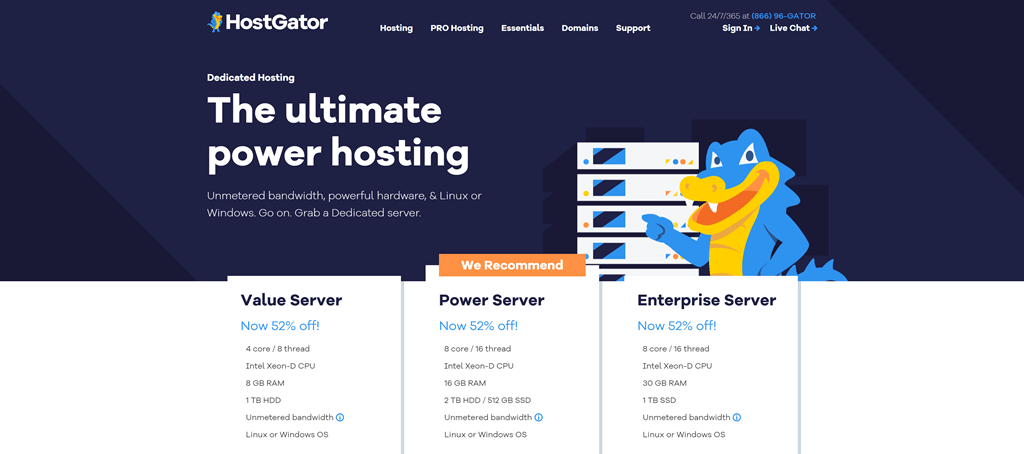
If you need the power of a dedicated server, HostGator has you covered. The cheapest plan from this category is the Value Server plan coming at $89.98 per month (paid every 36 months), with a current discount of 52%.
This plan offers:
- 4 core/8 thread processor
- 8 GB RAM
- 1 TB HDD
All plans offer unmetered bandwidth, Intel Xeon-D CPU, and the ability to choose between Linux or Windows OS-run servers.
The second plan, called the Power Server plan, includes an 8-core/16-thread processor, as well as 16 GB RAM and 2 TB HDD/512 GB SSD memory.
The best and most expensive plan in this category is the Enterprise Server plan coming at $139.99 per month with the current 52% discount. It has the same 8-core/16-thread processor as the Power Server plan, but it offers 30 GB RAM and 1 TB SSD memory.
HostGator’s dedicated hosting plans allow you full server control, which means you’ll have at your disposal the whole array of system resources.
You’ll also be able to choose between HDD (space) and SDD (speed) hard drives, depending on what your site needs.
The dedicated hosting plans give you DDoS protection so you don’t get too worked up about your site and your resources, should an attack on your server occur.
The included IP-based firewall is there to keep your server safe and to assure optimal performance, whatever happens.
You can also choose between cPanel and WHM on Linux or Plesk and WebMatrix on the Windows server.
All of HostGator’s dedicated servers are hosted at a US location, a Tier 3 data center. Also, HostGator offers a network guarantee that your site is always going to be online.
WordPress Hosting Plans
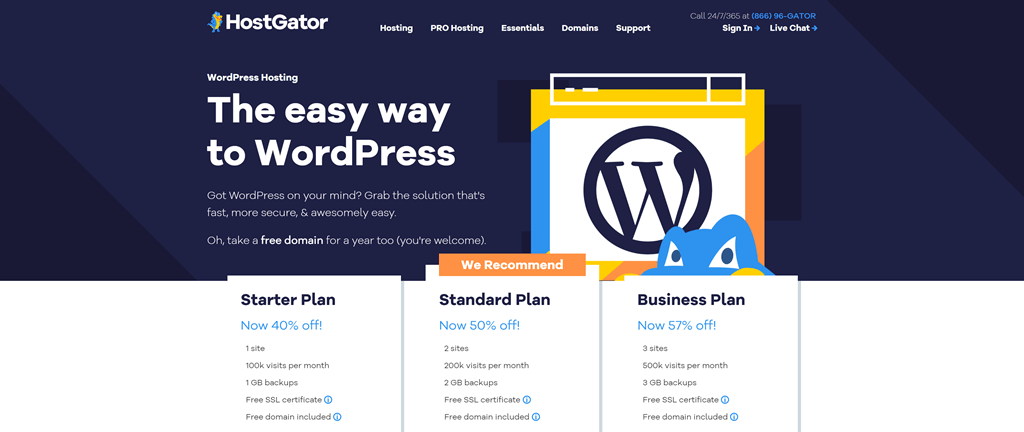
If you’ve set your mind to have a site in WordPress, it’s best to get one of HostGator’s WordPress hosting plan packages.
The cheapest one, called the Starter plan, starts at $5.95 per month, with the current 40% discount, paid on a 36-month basis.
It includes one site, 100k visits per month, and 1 GB data backup. The rest of the plans just double or triple the same key features as the first plan. So the second, the Starter plan, includes two sites, 200k visits per month, and 2 GB worth of backups. And the third, the Business hosting plan, which costs $9.95 per month with the current 57% discount, offers the hosting of three sites, 500k visits per month, and 3 GB worth of data backup.
All WP hosting plans include a domain (for a year), an SSL, and free email with up to 25 mailing lists.
Reseller Hosting Plans
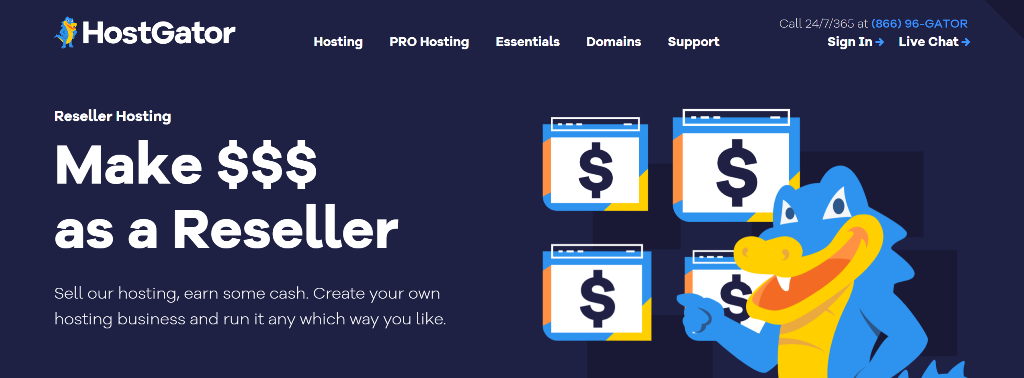
If you want to offer hosting services to your clients, but don’t want the hassle that comes with creating a hosting company from scratch, then why not get one of HostGator’s reseller hosting plans?
The Aluminum plan, the cheapest in this category, comes at $19.95 per month with the current 43% discount, and of course, paid every 36 months. It offers 60 GB disk space and 600 GB bandwidth.
The second plan called the Copper plan offers 90 GB disk space and 900 GB bandwidth, and the third plan called the Silver plan offers 140 GB disk space and 1400 GB bandwidth.
All plans include unlimited websites and an SSL.
This hosting category also comes with free billing software (called WHMCS or Web Hosting Billing & Automation Platform), already automatically installed in whichever plan you choose.
Also, you’ll get complete flexibility when it comes to payment methods, resource allocation, and any other services you want to provide for your clients that come to your mind.
Windows Hosting Plans
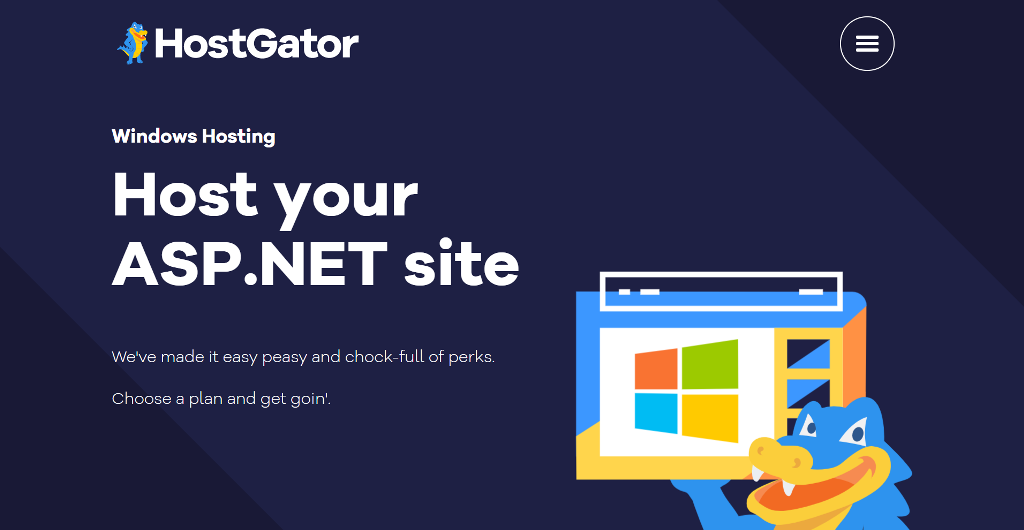
And if you really need to work on a Windows-operated server, HostGator has you covered. You can choose between two plans here – the Personal plan, coming at $4.76 per month (with a current discount of 20%), and the Enterprise plan, coming at $14.36 per month (also discounted by 20%), paid on a 36-month basis.
The Personal plan offers registration of a single domain; unmetered disk space, unmetered bandwidth, and an SSL security certificate come in both plans. The Enterprise plan allows for the registration of five domains and it also comes with a free dedicated IP.
HostGator’s Windows hosting plan offers a host of powerful admin tools such as file manager, scheduled tasks, secure directories, and a lot more. It also offers programming features such as ASP and ASP.NET 2.0 (3.5, 4.0, and 4.7), as well as PHP, SSICurl, GD Library, MVC 5.0, and AJAX.
As with most of its hosting plans, HostGator here also offers one-click installations of important applications such as WordPress and other open-source scripts.
The Plesk control panel, loaded with features, is included in the Windows hosting plans. It will make it that much easier to create websites and set up applications, among other things.
One of the greatest things about the Windows hosting plans is how free you are to manage the server and build it as you, please. You get an unlimited amount of sub-domains, FTP and email accounts, Microsoft SQL and MySQL, and Access databases.
Competitors to HostGator
While HostGator offers solid hosting solutions, it’s not the only game in town. I’ve personally tested several alternatives that might better suit your specific needs. Let’s dive into some top contenders:
Bluehost
In my experience, Bluehost consistently delivers excellent value. Their entry-level plan starts at just $1.99/month (as of my last check), which is indeed more budget-friendly than HostGator.
What sets Bluehost apart:
- WordPress integration: As an official WordPress.org recommended host, Bluehost offers seamless WordPress installations and management tools.
- Free domain: Unlike HostGator’s limited offer, Bluehost includes a free domain for the first year on all plans.
- Resource allocation: Even on basic plans, I’ve found Bluehost to be more generous with storage and bandwidth.
- User-friendly interface: Their custom dashboard is intuitive, making it easier for beginners to manage their sites.
- Performance: In my speed tests, Bluehost often outperformed HostGator, especially for WordPress sites.
Bluehost is an excellent choice for WordPress users, small businesses, and those prioritizing ease of use. I recently helped a client migrate from HostGator to Bluehost, and they saw noticeable improvements in site speed and uptime.
Hostinger
Hostinger has made waves with its ultra-competitive pricing. Their cheapest shared hosting plan starts at $2.99/month (with current promotions), making it one of the most affordable options available.
Key Hostinger advantages:
- Speed optimization: Their LiteSpeed web servers and built-in caching deliver impressive page load times.
- Global data centers: Choose from multiple server locations to optimize for your target audience.
- Advanced security: Free SSL, DDoS protection, and daily backups come standard.
- Scalability: Their cloud hosting plans offer a smooth upgrade path as your site grows.
- Developer-friendly features: Git integration, SSH access, and staging environments are available on higher-tier plans.
While Hostinger’s interface has a steeper learning curve than HostGator’s cPanel, I’ve found their site performance and customer support to be excellent resources for overcoming any initial hurdles.
DreamHost
DreamHost stands out for its robust security features and privacy-focused approach. Their shared hosting plans start at $2.59/month.
DreamHost differentiators:
- 97-day money-back guarantee: This extended trial period gives you ample time to test their services.
- Privacy protection: Free domain privacy is included, a feature often charged extra by other hosts.
- Unlimited resources: Most plans offer unmetered bandwidth and storage.
- US-based support: If you prefer domestic customer service, DreamHost delivers.
- Green hosting: They offset 100% of their carbon emissions, appealing to environmentally conscious users.
I’ve used DreamHost for several client projects requiring enhanced security measures, and their malware removal and prevention tools have proven invaluable.
Our Verdict ⭐
After extensive testing and real-world use, I can confidently say that HostGator is a solid choice for many website owners. It’s particularly good for those seeking an affordable, user-friendly hosting solution with reliable uptime. In my experience, HostGator consistently delivers on its promise of 99.99% uptime, which is crucial for maintaining a professional online presence.
Get unlimited bandwidth, disk space, email accounts, and more with HostGator's affordable plans. Plus, enjoy 24/7 support and free site migration.
For newcomers to web hosting, HostGator’s basic shared plans offer an excellent starting point. I’ve set up multiple client sites on these plans and found them more than capable of handling small to medium-sized websites with ease. The affordability factor is a significant plus, especially for those working with tight budgets.
As your site grows, you might find yourself needing more resources. In such cases, HostGator’s cloud plans are worth considering. I recently migrated a client from a shared to a cloud plan, and the improvement in speed and overall performance was noticeable. These plans offer a good balance of enhanced features and affordability.
For WordPress enthusiasts, HostGator’s managed WordPress hosting is a standout option. I’ve used these plans for several projects and appreciate the optimized environment and streamlined management tools. It’s a convenient all-in-one solution that takes care of many technical aspects, allowing you to focus on content creation and site design.
One of HostGator’s strengths lies in its user-friendly tools. Their website builder, which I’ve used for quick client projects, is intuitive and produces professional-looking results. The cPanel interface is straightforward, even for those new to web hosting. The QuickInstall feature has saved me countless hours, allowing for rapid deployment of popular applications.
While HostGator offers good value, especially with their entry-level plans, it’s important to note that it may not be the perfect fit for everyone. In my experience working with various clients, I’ve found that some outgrow HostGator’s offerings as their needs become more complex. For instance, one e-commerce client required more robust security features and dedicated resources that HostGator’s shared or cloud plans couldn’t provide.
If you’re considering HostGator, I recommend taking advantage of their 45-day money-back guarantee. This generous trial period allowed me to thoroughly test their services for several clients before committing long-term. It’s a risk-free way to ensure the hosting environment meets your specific needs.
Who should choose HostGator? Based on my experience, it’s an excellent choice for small business owners, bloggers, and entrepreneurs who prioritize ease of use and affordability. The straightforward control panel and intuitive website builder make it possible to launch a professional-looking site without extensive technical knowledge. However, as your site grows in complexity or traffic, you may need to reassess your hosting needs.
Recent Improvements & Updates
HostGator constantly improves its hosting services with additional features. HostGator has introduced several updates and improvements to its services and hosting products recently (last checked January 2025):
- Easier Customer Portal: They’ve redesigned their customer portal to make it easier for you to handle your account. Now, you can quickly change your contact details or how you want to handle your billing.
- Faster Website Loading: HostGator has teamed up with Cloudflare CDN, which means your website can load faster for visitors around the world. This is because Cloudflare has servers globally that keep a copy of your site, so it loads quickly no matter where someone is accessing it from.
- Website Builder: The Gator Website Builder from HostGator uses AI to assist users in creating websites, making the process simpler, especially for those with limited technical skills. This tool allows for easy setup of blogs or e-commerce stores as part of the site.
- User Interface and Experience: HostGator uses the popular cPanel for its control panel, known for its ease of use, making it a good choice for both beginners and experienced users. The user interface is intuitive, simplifying tasks like managing files, databases, and email accounts.
- Security Features: HostGator’s hosting services include various security features such as free SSL certificates, automatic backups, malware scanning and removal, and DDoS protection. These features enhance the security and reliability of websites hosted on their platform.
Reviewing HostGator: Our Methodology
When we review web hosts, our testing and evaluation are based on these criteria:
- Value for Money: What types of web hosting plans are on offer, and are they good value for money?
- User Friendliness: How user-friendly is the signup process, the onboarding, the dashboard? and so on.
- Customer Support: When we need help, how quickly can we get it, and is the support effective and helpful?
- Hosting Features: What unique features does the web host provide, and how do they stack up against competitors?
- Security: Are essential security measures like SSL certificates, DDoS protection, backup services, and malware/virus scans included?
- Speed and Uptime: Is the hosting service fast and reliable? What types of servers do they use, and how do they perform in tests?
For more details on our review process, click here.
Get 70% OFF HostGator's plans
From $3.75 per month
What
HostGator
Customers Think
Cheap hosting that just works!
Web hosting that just works! No bells and whistles but my site is online without any downtime or dramas (fingers crossed). I want to recommend HostGator!
Amazing Hostgator
HostGator is amazing!! Their support is 6 stars in my opinion. Every time I’ve had an issue and called the support team has always gone out of their way to help. I am very happy with their service. Just upgraded to their business plan, and my website is now lightning fast. If your looking for the best, definitely put Hostgator to the test, You will not be disappointed!
Cheaper than SiteGround but..
I used to be a Siteground customer. The only reason I moved my website to Hostgator was the cheap price tag. At the time, I was paying Siteground about $10 a month. And Hostgator was only half the price. Back then I didn’t know that they double their price after your first year. I had heard mixed reviews about Hostgator but I never thought too much of it. As of now, my site runs fine but it slows down from time to time for no reason and customer support just plain sucks. I am paying a lot less than Siteground for now but I will move my site back to Siteground when they double their price at the end of my current plan.

